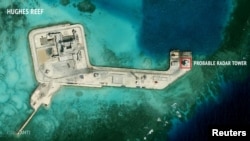China and the Philippines are considering having talks on their conflicting claims to parts of the South China Sea.
On Tuesday, the Permanent Court of Arbitration (PCA) rejected China’s historical claim to most of the South China Sea. The court made its ruling based on the United Nations Convention on the Law of the Sea.
The court in The Hague, the Netherlands, is an international organization that seeks to resolve disputes between nations. Both China and the Philippines are members.
On Tuesday, Philippine Foreign Secretary Perfecto Yasay called the PCA ruling "an important contribution."
Chinese officials, however, questioned the PCA’s fact-finding process. They say the court does not have the authority to make a ruling. And, they have said they would prefer bilateral talks to resolve the countries’ issues related to the South China Sea.
Wang Yi, China’s foreign minister, spoke after the PCA released its decision. He said the Philippines had recently made statements that showed a willingness to continue talks about the South China Sea.
Such negotiations could help prevent threats of war. They could also make the waters between the two countries safer for commercial use on both sides, especially for Philippine fishermen.
And, they could help China repair its image as a bully in the South China Sea dispute.
Philippine position
Many Filipinos cheered the PCA ruling, which said China had violated Philippine rights to use waters off its west coast.
But some Filipinos also expressed fear. They worried China would ignore the ruling and make things harder for Philippine fishing boats in disputed waters. Their concerns increase pressure on the government to hold talks.
Jay Batongbacal directs the Institute for Maritime Affairs and Law of the Sea at the University of the Philippines. He said the Philippine president, Rodrigo Duterte, will likely try to negotiate a friendly settlement with the Chinese.
But, Batongbacal added, the Philippine public will expect its government to take a strong position on the issues and to get a positive result.
Chinese position
If the two countries go forward with talks, analysts say, China is in a difficult position. It must decide whether to stay firm on claiming territory in the South China Sea, or to find a diplomatic way out of conflict.
Tang Siew Mun is a senior fellow at the regional strategic and political studies program under the ISEAS-Yusof Ishak Institute.
He wrote in an email to VOA that China will try to establish its sovereignty by showing its military force. However, Tang said, such a show would only damage China’s international reputation.
He said talks with Philippine officials would give China a chance to improve its image.
But even if the Philippines and China reach a deal later, another analyst noted that the U.S. and other countries will likely still insist that China follow the decision of the PCA. That decision says China does not have the rights to 12 nautical mile territorial waters around most of the South China Sea’s islands and reefs.
Kong Lingjie is deputy dean of China Institute of Boundary and Ocean Studies at Wuhan University. He told VOA, “The U.S. government will give a lot of pressure for the Chinese government to implement the award. But China, its policy and position is very firm. It wouldn’t change even a bit.”
Kong added that China will follow the example set by the U.S. in 1986. At that time, the U.S. rejected an arbitration ruling reached by the U.N.’s International Court of Justice. That ruling supported Nicaragua’s complaints against the U.S. violations of its sovereignty. But the U.S. blocked enforcement of the judgment. In 1992, Nicaragua withdrew its complaints.
I’m Anna Matteo.
Pros Laput contributed to this report from Manila and Saibal Dasgupta contributed from Beijing. Kelly Jean Kelly adapted it for Learning English. Mario Ritter was the editor.
_____________________________________________________________
Words in This Story
arbitration – n. a process of settling an argument or disagreement in which the people or groups on both sides present their opinions and ideas to a third person or group
bully – n. someone who frightens, hurts, or threatens smaller or weaker people
sovereignty – n. a country's independent authority and the right to govern itself








